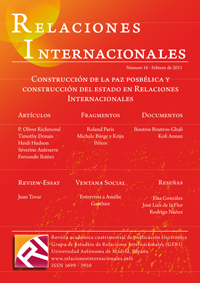The violence of neoliberal peacebuilding in africa: analysing its ‘traps’ through a gender lens
Keywords:
Africa, agency, women, gender, Neoliberal peacebuilding, localCopyright (c) 2011 Heidi HUDSON

This work is licensed under a Creative Commons Attribution-NonCommercial-NoDerivatives 4.0 International License.
Abstract
Almost half of all peace agreements fail within the first five years of implementation. When that happens, there is a tendency to blame internal stakeholders rather than also questioning the impact of external intervention. This omission has severe consequences for the security of marginalised groups such as women and girl children. In Africa the gains women have made after the conflict are marred by high levels of gender-based violence. The article contends that there is a direct correlation between the failures of neoliberal peacebuilding in general and the ‘liberal’ way in which gender is integrated into post-conflict societies. Inappropriate approaches to gender mainstreaming may therefore contribute to structural violence. The goal of this contribution is to challenge international role players in how they frame peacebuilding processes and their constituent gender elements. The article opens with a critique of neoliberal peacebuilding, then focuses on a feminist critique of neoliberal peacebuilding and pays specific attention to issues of agency, the local, protection and representation. It concludes by offering some thoughts on a critical feminist alternative which is more attentive to power relations and reflective of the original non-statist interpretation of human security.





